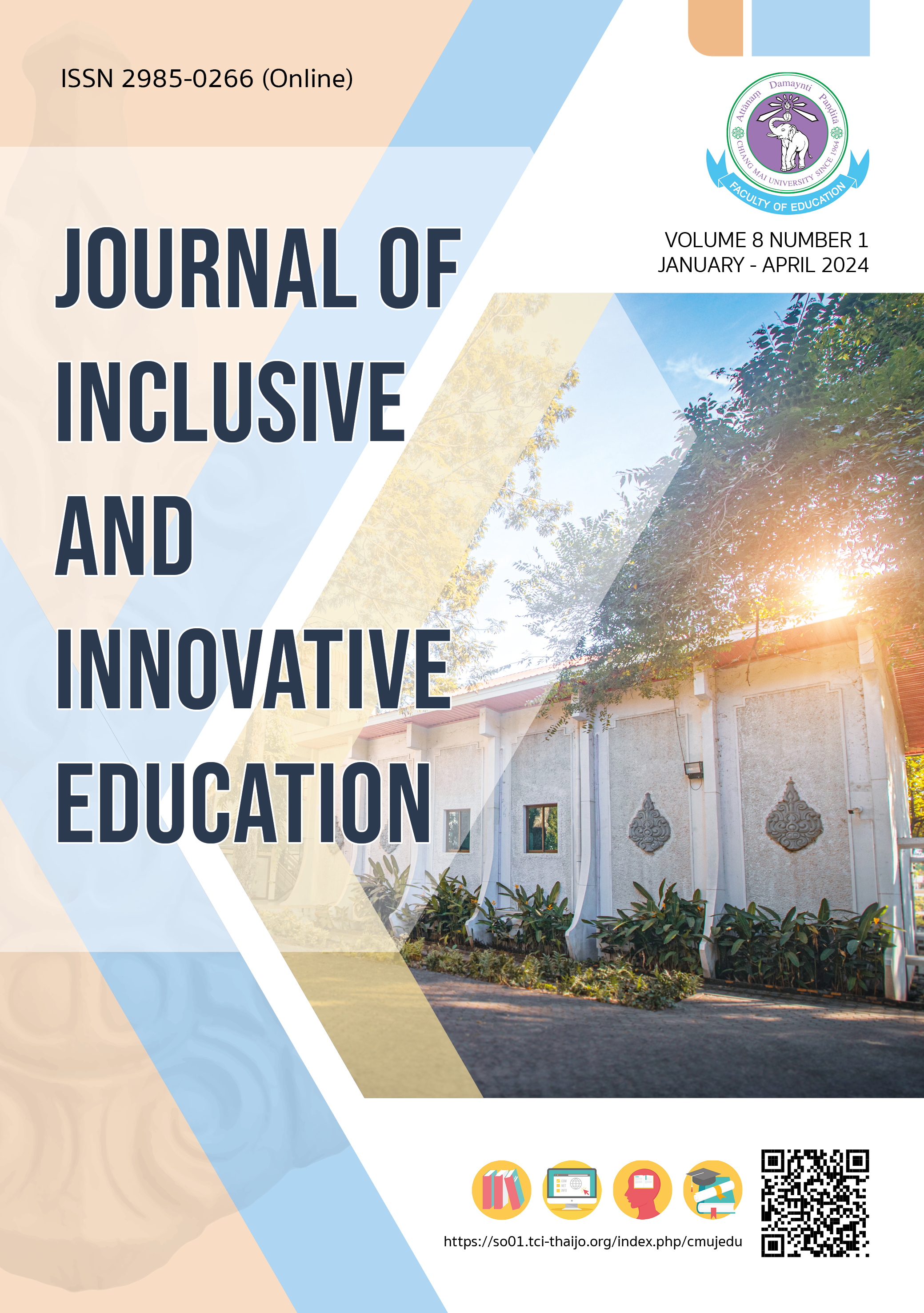ปัจจัยและกระบวนการพัฒนาผู้เรียนสู่ความสำเร็จในการทดสอบทางการศึกษาระดับชาติขั้นพื้นฐาน (O-NET) ชั้นประถมศึกษาปีที่ 6 วิชาภาษาอังกฤษของโรงเรียนชายขอบในประเทศไทย
Main Article Content
บทคัดย่อ
วัตถุประสงค์ของการศึกษาครั้งนี้ คือ 1) เพื่อศึกษาปัจจัยที่สนับสนุนให้โรงเรียนชายขอบประสบความสำเร็จในเรื่องผลการทดสอบ O-NET ชั้นประถมศึกษาปีที่ 6 วิชาภาษาอังกฤษ และ 2) เพื่อเปรียบเทียบกระบวนการในการพัฒนาผู้เรียนของโรงเรียนชายขอบในแต่ละพื้นที่ โดยใช้กรอบแนวคิดทางจิตวิทยาการศึกษาและสังคมวิทยาการศึกษา ประกอบกับการวิจัยแบบพหุกรณีศึกษาและวิธีการเก็บรวบรวมข้อมูลเชิงคุณภาพ ได้แก่ การสัมภาษณ์ การบันทึกภาคสนาม และการวิเคราะห์เอกสาร พื้นที่การวิจัยคือโรงเรียนกรณีศึกษาจำนวน 4 แห่ง และผู้ให้ข้อมูล จำนวน 20 คน ทั้งนี้ การใช้เทคนิคการวิเคราะห์แบบประเด็นได้นำไปสู่ผลการวิจัยดังนี้ 1) ปัจจัยที่สนับสนุนให้เกิดความสำเร็จของโรงเรียนกรณีศึกษาแต่ละแห่งมีประเด็นที่คล้ายคลึงกัน ได้แก่ การทำงานร่วมกันทั้งองคาพยพ คุณลักษณะของครูแบบมืออาชีพ การสอนที่เน้นสมองเป็นฐาน ความรู้สึกท้าทายต่อปัญหาทางการศึกษา และการเปลี่ยนแปลงปฏิบัติการสอน ทั้งนี้ ปัจจัยสนับสนุนที่มีความแตกต่าง ได้แก่ คุณลักษณะของครูนวัตกรและการกระทำทางสังคม และ 2) โรงเรียนกรณีศึกษาได้สะท้อนถึงกระบวนการในการพัฒนาผู้เรียนตามทฤษฎีการเรียนรู้สู่การเปลี่ยนแปลง อีกทั้งมีโรงเรียนกรณีศึกษาหนึ่งแห่งที่ปรากฏให้เห็นถึงกระบวนการปลดปล่อยจากภาวะแบบอาณานิคมทางการศึกษาอย่างครบถ้วน โดยระดับขั้นที่แตกต่างไปจากโรงเรียนกรณีศึกษาอื่นก็คือ การแก้ปัญหาอย่างเป็นระบบและในระดับลึก รวมถึงการพัฒนาทักษะภาษาอังกฤษของผู้เรียนที่ไปได้ไกลกว่าการสอบ O-NET ผลจากข้อค้นพบดังกล่าวได้ชี้ให้เห็นว่า การเปลี่ยนแปลงในปฏิบัติการสอนในชั้นเรียนและโรงเรียนแม้เพียงเล็กน้อยก็สามารถสร้างผลลัพธ์การเรียนรู้ของผู้เรียนในโรงเรียนชายขอบให้สูงขึ้นได้แม้จะอยู่ในเงื่อนไขแห่งความขาดแคลนด้านทรัพยากรและสภาพทางเศรษฐกิจและสังคมของผู้เรียน
Article Details

อนุญาตภายใต้เงื่อนไข Creative Commons Attribution-NonCommercial-NoDerivatives 4.0 International License.
หากผู้เสนอบทความมีความจำเป็นเร่งด่วนในการตีพิมพ์โปรดส่งลงตีพิมพ์ในวารสารฉบับอื่นแทน โดยกองบรรณาธิการจะไม่รับบทความหากผู้เสนอบทความไม่ปฏิบัติตามเงื่อนไขและขั้นตอนที่กำหนดอย่างเคร่งครัด ข้อมูลของเนื้อหาในบทความถือเป็นลิขสิทธิ์ของ Journal of Inclusive and Innovative Education คณะศึกษาศาสตร์ มหาวิทยาลัยเชียงใหม่
เอกสารอ้างอิง
Allison-Burbank, J. D., Conn, A., & Vandever, D. (2023). Interpreting Diné epistemologies and decolonization to improve language and literacy instruction for Diné children, Language, Speech, and Hearing Services in Schools, 54(3), 707-715.
Barone, D. (2003/2004). Second grade is important: Literacy instruction and learning of young children in a high-poverty school. Journal of Literacy Research, 35(4), 965-1018.
Carlisle, J. F., Kelcey, B., & Berebitsky, D. (2013). Teachers' support of students' vocabulary learning during literacy instruction in high poverty elementary schools. American Educational Research Journal,50(6), 1360-1391.
Cochran-Smith, M. (2004). The problem of teacher education. Journal of Teacher Education, 55(4), 295-377.
Collazo, N. A. J., & Hindrix, K. (2023). A pioneering framework for decolonizing higher education. SN Social Sciences, 3, 1-19.
Copland, F., Garton, S., & Burns, A. (2013). Challenges in teaching English to young learners: Global perspectives and local realities. TESOL Quarterly, 48(4), 738-762.
Cummins, J. (2007). Pedagogies for the poor? Realigning reading instruction for low-income students with scientifically based reading research. Educational Researcher, 36(9), 564-572.
EF Education First. (2023). English proficiency index. Retrieved from https://www.ef.com.
Egilsson, B. R., Einarsdóttir, J., & Dockett, S. (2021). Parental experiences of belonging within the preschool community. International Journal of early Childhood, 53, 31-47.
Ellis, S., Thompson, I., McNicholl, J., & Thomson, J. (2018). Student teachers’ perceptions of the effects of poverty on learners’ educational attainment and well-being: Perspectives from England and Scotland. In O. McNamara & J. McNicholl (Eds.), Poverty Discourses in Teacher Education (1st ed.). Routledge.
Escobar, A. (2018). Designs for the pluriverse radical interdependence, autonomy, and the making of worlds. Durham: Duke University Press.
Finn, G. M., & Matthan, J. (2021). Colonization, cadavers, and color: Considering decolonization of anatomy curricula. The Anatomical Record, 305, 938-951.
Funa A. A., Ricafort, J. D., Jetomo, F. G., & Lasala Jr. N. L. (2024). Effectiveness of brain-based learning toward improving students’ conceptual understanding: A meta-analysis. International Journal of Instruction, 17(1), 361-380.
Habermas, J. (1987). The theory of communicative action: Volume two: Lifeworld and system: A critique of functionalist reason. Boston: Beacon Press.
Lao, R., Parks, T., Phuaphansawat, V., Tongliemnak, P., Lawthong, N., Nakyam, S., & Lek-Uthai, A. (2021). Jak kham thathay su khunnaphap kansueksa khong prathedthai: Kodrabiab kanborehan lae khampenphunum [The challenges in the delivering quality education in Thailand: Rules, resources and leadership]. The Asia Foundation. [in Thai]
Linjaroen, A., Ardwichai, S., & Chanin. P. (2009). The causal factors effect on low level of O-NET in grade 6 and 12. (Research report). Bangkok: The National Institute of Educational Testing Service. [in Thai]
Massey, D. (2010). “You teach!” beginning teachers’ challenges to teacher educators. Reading Research and Instruction, 43(4), 75-94.
Mezirow, J. (2008). An overview on transformative learning. In K. Illeris (Ed.) Contemporary theories of learning: Learning theorists…In their own words (pp. 90-105). London: Routledge.
Miles, M. B., Huberman, A. M., & Saldana, J. (2014). Qualitative data analysis: A Methods sourcebook. London: Sage.
Nawarat, N. (2018). Kansueksa phahuwattanatham: Mummong chaeng vipak lae kan patibutkan nai rongrain [Multicultural education: Critical perspectives and praxis in schooling]. Chiang Mai: Faculty of Education, Chiang Mai University. [in Thai]
Nomnian, S., & Arphattananon, T. (2018). School administrator’s competencies for effective English language teaching and learning in Thai government primary school. IAFOR Journal of Education, 6(2), 51-70.
Office of the basic education commission. (2022, May 31). Moving an educational administrator of office of the basic education commission 2022. Office of the basic education commission. [in Thai]
Olsen, A., Fassbender, W., Long, D., & Olsen, K. (2022). Schools, communities, and teachers: How rural sense of belonging holds impact for English teachers in place. Australian and International Journal of Rural Education, 32(2), 108-125.
Patton, M. (2002). Qualitative research and evaluation methods. Sage.
Phairot, E., Khemanuwong, T., Boonthong, N., Angsuwatanakul, T., & Uampittaya, P. (2022). Examining gender and socioeconomic status predictability in English reading comprehension among Thai EFL undergraduates. Journal of Faculty of Education Pibulsongkram Rajabhat University, 9(1), 96-111.
Poohongthong, C. (2023). Thailand’s sustainable literacy competence in peripheral school: The Bannongkae school model. Thammasat Review, 26(2), 24-43.
Smagorinsky, P. (2001). If meaning is constructed, what is it made from? Toward a cultural theory of reading. Review of Educational Research, 71(1), 133-169.
Spivey, D. S. (2006). Characteristics of teachers who are consistently successful with economically disadvantaged students: A qualitative study about fourth and fifth grade teachers who are successful with economically disadvantaged students [Unpublished master’s thesis]. North Carolina State University.
Teeraeak, A. (2017). Phasa choa phasa nay: Kanmueang bueanglang kansueksa phasa angkruet samay ratchakantiha [Royal discourse noble language: The politics behind English education in the reign of Rama V]. Matichon Publishing. [in Thai]
The national institute of educational testing service. (2023). Results of the O-NET. Retrieved from https://catalog.niets.or.th/ [in Thai]
The national statistical office. (2023). Poverty line by region and province. Retrieved from http://statbbi.nso.go.th [in Thai]
Winichakul, T. (2020). Moments of silence: The unforgetting of the October 6, 1976, Massacre in Bangkok. Honolulu: University of Hawaii Press.
Yin, R. K. (2018). Case study research and applications: Design and methods (6th ed.). CA: Sage Publications.
Zehner, E. R. (2017). Improving English educational outcomes in Thailand’s semi-rural upper south: Toward getting better results. Journal of Education and Social Sciences, 7(1), 257-274.


